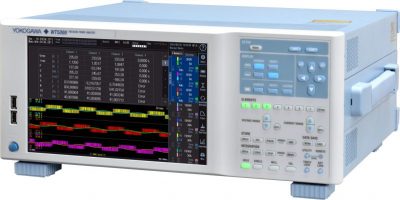Precision Power Analyser addresses EVs and renewable tech
Yokogawa has developed a roadmap of capabilities with the WT5000 Precision Power Analyser which boasts ±0.03 per cent accuracy. Other characteristics are stability, noise immunity and flexibility to meet the measurement needs of developers of energy-efficient systems, such as electric vehicles, renewable energy and energy efficient technologies for home and office and industrial equipment.
Yokogawa points out that these evolving industries’ technologies can be met without the need to buy new test equipment each time to meet evolving international standards, changing test conditions and time to market demands.
The WT5000 achieves the world’s highest measuring accuracy: ±0.03% of total at 50/60Hz, claims Yokogawa. This enables it to evaluate the power consumption, loss, and efficiency of electrical and electronic devices. Its wide dynamic current range is particularly useful for tests on energy-saving designs, adds the company.
The WT5000 uses an 18-bit ADC with a sampling frequency of maximum 10MSsample per second. This is double the five Msamples per second of the earlier generation of Precision Power Analyser available from Yokogawa. This enables users to accurately capture waveforms from the latest high-speed inverter devices for stable measurements.
Dimensions are the same as for existing models in Yokogawa’s WT series. The analyser also has a touchscreen and graphic user interface (GUI) with numeric or graphical representations.
The analyser incorporates up to seven input channels to support applications that previously could only have been measured by synchronising several separate instruments, resulting in savings in terms of installation space, communications overheads and cost-effectiveness, claims the company. The plug-in modular input elements can be swapped directly by the user to meet the test requirements of a particular project.
The 30 and 5.0A elements, for example, can be switched for applications involving electric vehicles or fuel-cell vehicles, where developers are increasingly required to evaluate a number of four motors. Using the WT5000 equipped with the /MTR1 and /MTR2 options, it is possible to evaluate up to four motors simultaneously with one unit. These allow the input of four channels, flexible measurement of the A, B, C and Z phases of each motor can be carried out.
Target applications include electromechanical systems, aerospace, medical systems, transformers, renewable and fossil energies as well as robotics, all of which demand higher power systems and high levels of reliability.
The WT5000 can carry out two harmonic measurement functions simultaneously, each at up the 500th order and up to 300kHz fundamental waveform. This makes it possible to measure the carrier frequency component from the rotational speed of the motor in the inverter drive and also to check the influence of the carrier frequency on the motor drive, explains Yokogawa.
An increasing number of applications require the evaluation of larger-current devices, typical examples being electric vehicles and large-scale solar installations. In these cases, external current sensors are often used. An external current sensor input function is fitted as standard in the input element of both the 30 and 5.0A input elements of the WT5000. For much higher currents (up to 2000A rms) dedicated high-current sensors are available. Yokogawa AC/DC current sensor CT series is current output type in order to prevent noise influence.




